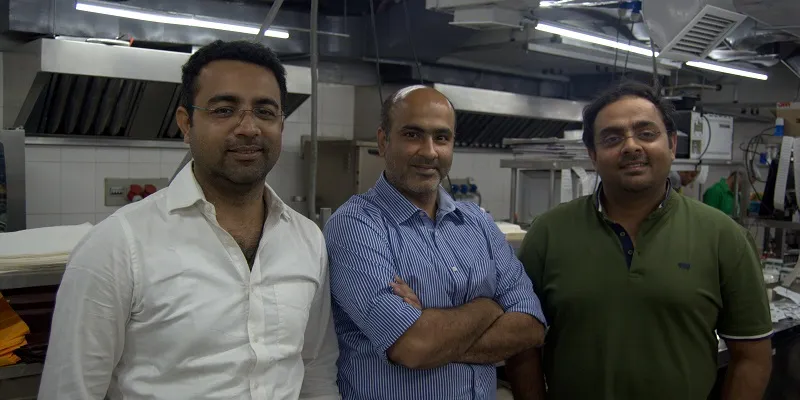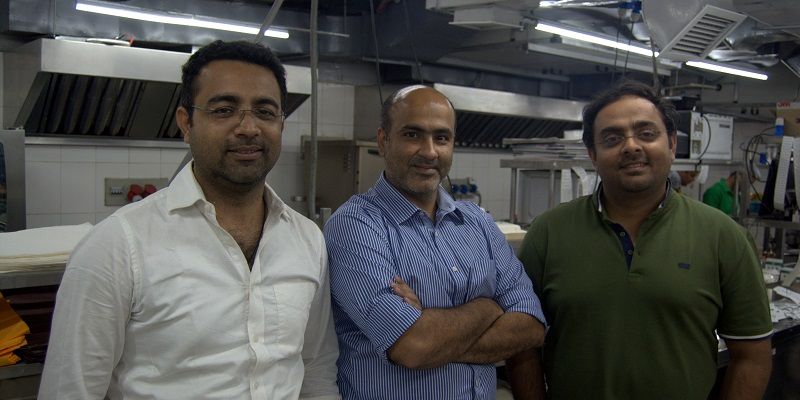What made this VC turn into a food entrepreneur with Twigly
The Internet restaurant based in Delhi is an online kitchen that delivers lunches and dinners within a 45-minute timeframe.
While we usually just have to worry about getting a table at our favourite restaurant, the chef behind the scenes is probably working himself into a frenzy to get beautifully plated food in front of you in quick time.
The work actually begins the night before. A group of tireless chefs prep for the following day, while in the morning, another batch of chefs take over to whip up meals for lunch and dinner time. And the cycle continues.
Any restaurant that serves during lunch and dinner hours runs a non-stop, frenetic kitchen. But this is not the only reason why the food business is a tough nut to crack. Operations are intense, but the economics are complicated, especially if you add delivery into the mix.
Then, one needs to manage another layer of logistics operations. Hence, many in the startup ecosystem are wary of the food business, especially given how some foodtech ventures have folded in the past.

And yet there is no denying the perpetual need for ‘roti, kapada aur makhan’ (food, shelter and clothing). People will always need to eat; that will never change. And this alone is a good enough reason for entrepreneurs and investors to bet on ventures in the space of food, internet kitchen and online food delivery.
So, despite the obvious risks, the space drew the attention of Sonal Minas, a former vice president at SAIF Partners. The 34-year-old started Twigly, an Internet restaurant, in 2015. Sonal says,
“All of us are foodies at heart. While none of us have directly worked in food before, there is relevant experience that we have all drawn from our past experience that has helped us put together Twigly. Additionally, we realised there is a big space in terms of delicious, wholesome, healthy options available to people working in offices."
In our busy past lives, we end up ordering from fast food chains, which becomes boring very soon, from neighbourhood dhabas, which typically serve very unhealthy food, or from brick-and-mortar restaurants, which becomes very expensive. Twigly was created to bridge this gap–provide fine-dining food at a fraction of the cost, without compromising on the experience.”
Building the team
Twigly took shape when Sonal roped in his friends Rohan Dayal and Naresh Kumar Kachhi. Prior to Twigly, Rohan had co-founded WanderShip in 2013, a web/mobile application that provides users a simple and intuitive way to browse, create, customise and book holidays.
In the past he has worked with Snapdeal, Michael & Susan Dell Foundation, Grail Research and Evalueserve Inc. Naresh, on the other hand, has worked with companies like Intel Corporation and Kiwi Inc.
Based out of NCR, and started in August 2015, Twigly works on an online kitchen model, where the food is made at a central kitchen and shipped to customers directly. The aim is to set up a modern, fresh food supply chain, and provide customers with meals made using high quality, locally-sourced produce. Twigly boasts of a limited menu of fresh food to minimise wastage, which changes daily to maintain variety for the regular users.
“We focus on the ‘white space’ in the market—sandwiches, pastas and pizzas. In a five-km radius around our kitchens, we offer a 45-minute service guarantee. Our focus on freshness and technology ensures good customer experience through quality food, timeliness in delivery, and a simple ordering process.
Using new technologies, equipment and approaches, the team states that it is building a repertoire of iconic dishes that are easy to scale. The internal technology platform enforces processes to ensure fresh ingredients, and Twigly has also set up a delivery process that minimises the time between ordering and getting food.
Challenges of setting up a food business
Like any other food business, delivery has been a challenge for Twigly. Demand is concentrated during peak hours of lunch and dinner, and people want their food fast and fresh. “At the same time, we cannot have an infinite delivery team. We understand that customers do not want food delivery to be a black box where they don’t know when they will get their order,” adds Sonal.
Another challenge that the team faced was in ensuring quality and consistency of food with scale. Sonal adds that the Twigly backend keeps track of shelf life and expiry of all items being used in the kitchens.
Twigly has its own ordering platform that uses the existing resources optimally to provide better deals to the customers at the same time. “Our delivery system is linked to traffic data, and helps decide which orders can be pooled together while meeting the delivery guarantee of 45 minutes. We introduced our ‘Order for Later’ feature to bring predictability for customers and it has really picked up well,” says Sonal.
The platform tracks individual ingredients in the kitchen, and automatically places orders to vendors based on stock availability. About 65-70 percent of daily orders are from Android and iOS apps, where users order through four easy taps. These have been optimised to work even on slow 2G networks. Most backend systems have been developed in-house, which gives the team more control to introduce customisations to get the maximum output from the operations.
The space
Foodtech has been a dicey space. While 2015 saw VCs salivating on the sector, and every investor put money into startups in the space, the end of the year saw several pitfalls. The biggest one being TinyOwl.
Once lauded as the fastest growing food delivery startup that rivalled Swiggy, its then competitor, the firm reached a rather sticky end after raising $28 million from the likes of Matrix Partners, Nexus Venture Partners and Kunal Bahl and Rohit Bansal. Soon, several other food startups like Dazo and Spoonjoy folded as well.
The ones believed to have strong models are Swiggy, Zomato and FreshMenu. Of these, FreshMenu is a strong player in the internet kitchen space. There also is InnerChef, backed by redBus' Phanindra Sama, and now even Swiggy has ventured into the cloud kitchen space, with a test pilot at Koramangala, Bengaluru. Recently, Faasos raised a $6.4 million funding from Lightbox Ventures and Sequoia Capital as well.
Now, with speculations rife about Uber Eats' big launch this May, most Indian startups in the space seem to be ramping operations to meet increased competition.
Twigly has raised $800,000 in seed funding so far: in September 2015, it raised $200,000, followed by $600,000 in July 2016. Currently, the team is in talks with investors to raise Series A, but the deal will only close by March-May next year.
The startup claims to have registered 50 percent month-on-month growth. “We take feedback on each and every order, do gap analysis, and implement corrective action in case customer feedback on a particular dish or packaging reaches a tipping point. We have turned around approximately 10 recipes based on customer requests,” says Sonal.
Future plans
Within 17 months of operation, Twigly has established a user base of 10,000 customers. They currently run operations in Gurgaon and South Delhi and deliver close to 350 orders per day. With the new address in South Delhi, the company is targeting to serve about 1,000 orders a day in the next three quarters. Twigly aims to scale the business to $100 million in sales in the next 3-4 years.
Sonal adds that their technical mindset and focus on the entire consumer experience sets Twigly apart from its competition. “We are a no-nonsense food company, but we want to use all online distribution channels and provide a seamless experience to our customers, whether they are ordering from our platform or are a third-party service,” says Sonal.
The team is looking at more channels for ordering, including messaging and voice-enabled interfaces, which allows them to leverage technology, and reach people who still don’t or can’t order using app/web. In the long term, they also aim to predict when a user will be hungry and reach out to them with the perfect dish suggestion, with machine learning.
Additionally, Twigly is entering the private label and fast-moving consumer goods (FMCG) space. It has partnered with Godrej Nature’s Basket, Le Marche and Needs - the Supermarket. Twigly's private label products will include some base ingredients which are being used in the current operations to make the final product, but also have utility as a final product, such as hummus, pesto, dips etc.
Speaking of future plans, Sonal says,
“In FY18, the Twigly will add one more kitchen to its existing one in South Delhi and by November 2017 we are planning to open 3-4 sub-brands under Twigly for sandwiches, pizzas, and FMCG. We believe that by late 2017 we will be using AI to automate basic customer handling and order-taking procedures. We believe that a lot of customers still don’t or can’t order through the app/web. We think that voice-enabled interfaces can widen the customer base to a much larger set. The restaurant of the future is where the people want it to be, in their homes, offices or public places. Wherever it is Twigly will be there to serve them.”











